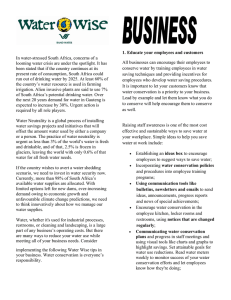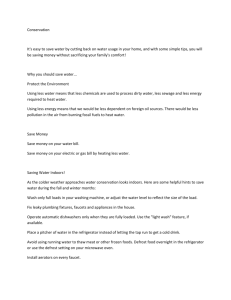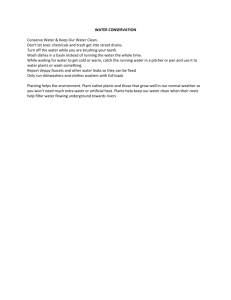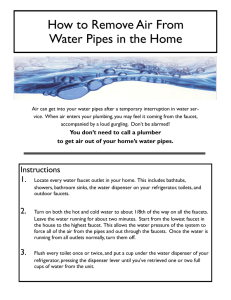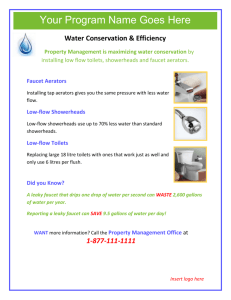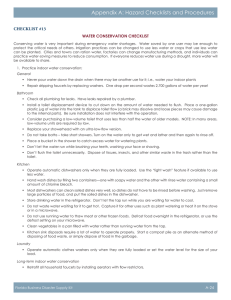WATER CONSERVATION IN YOUR CONGREGATION Lutherans
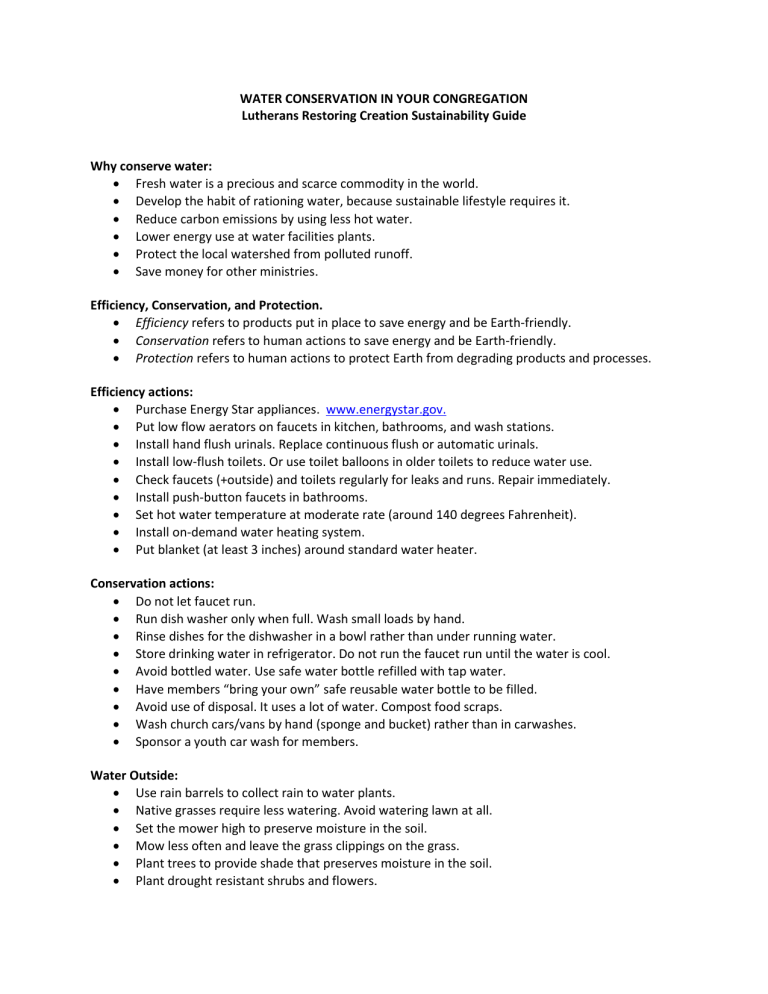
WATER CONSERVATION IN YOUR CONGREGATION
Lutherans Restoring Creation Sustainability Guide
Why conserve water:
Fresh water is a precious and scarce commodity in the world.
Develop the habit of rationing water, because sustainable lifestyle requires it.
Reduce carbon emissions by using less hot water.
Lower energy use at water facilities plants.
Protect the local watershed from polluted runoff.
Save money for other ministries.
Efficiency, Conservation, and Protection.
Efficiency refers to products put in place to save energy and be Earth-friendly.
Conservation refers to human actions to save energy and be Earth-friendly.
Protection refers to human actions to protect Earth from degrading products and processes.
Efficiency actions:
Purchase Energy Star appliances. www.energystar.gov.
Put low flow aerators on faucets in kitchen, bathrooms, and wash stations.
Install hand flush urinals. Replace continuous flush or automatic urinals.
Install low-flush toilets. Or use toilet balloons in older toilets to reduce water use.
Check faucets (+outside) and toilets regularly for leaks and runs. Repair immediately.
Install push-button faucets in bathrooms.
Set hot water temperature at moderate rate (around 140 degrees Fahrenheit).
Install on-demand water heating system.
Put blanket (at least 3 inches) around standard water heater.
Conservation actions:
Do not let faucet run.
Run dish washer only when full. Wash small loads by hand.
Rinse dishes for the dishwasher in a bowl rather than under running water.
Store drinking water in refrigerator. Do not run the faucet run until the water is cool.
Avoid bottled water. Use safe water bottle refilled with tap water.
Have members “bring your own” safe reusable water bottle to be filled.
Avoid use of disposal. It uses a lot of water. Compost food scraps.
Wash church cars/vans by hand (sponge and bucket) rather than in carwashes.
Sponsor a youth car wash for members.
Water Outside:
Use rain barrels to collect rain to water plants.
Native grasses require less watering. Avoid watering lawn at all.
Set the mower high to preserve moisture in the soil.
Mow less often and leave the grass clippings on the grass.
Plant trees to provide shade that preserves moisture in the soil.
Plant drought resistant shrubs and flowers.
Use watering can rather than hose for plants and flowers. Avoid sprinklers.
If you water at all, do so early in the morning or in the evenings.
Put bird baths to provide water for birds, when and where it is safe for standing water.
Protect the Environment:
Do not put toxic items down the drain: cleansers, bleach, detergents, and so on. Do not put grease, fat, or cooking oil down the drain. Make grease balls with nuts and raisin to hang for birds to feed on.
Avoid use of pesticides or herbicides or weed killers. These will run off into the water shed and pollute local waterways.
Plant rain gardens containing special plants with deep roots that absorb water so it does not runoff from roofs into the watershed or water ways.
Preserve part of the property as native prairie or have a section of untended wildflowers.
Educational actions:
Get the staff on board: maintenance, office workers, volunteers.
Put up reminder signs: Report water leaks. Do not let faucet run. Run dishwasher when full.
Bulletin instructions and explanations for water conservation.
Covenant: Invite members at worship to sign a community covenant to practice conservation.
Post this guide on the bulletin board or publish it in newsletter.
Promote these actions for members at home and work.
Advocacy and Public Witness:
Restore degraded water habitats such as local streams and lakes.
Promote the preservation of wetlands.
Learn about water problems around the globe.
Advocate for policies and laws to slow global warming.
Oppose practices of extraction for oil, gas, or minerals that threaten water resources.
